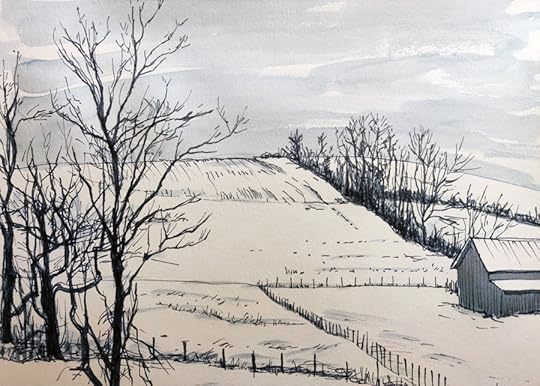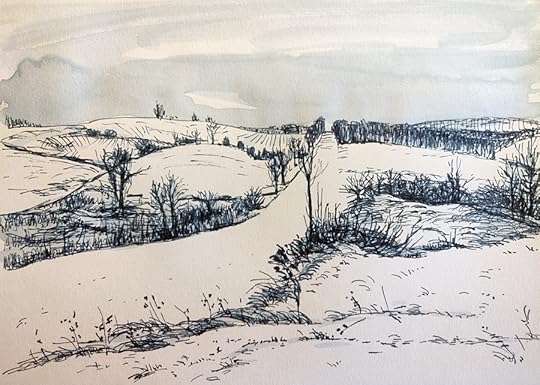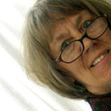Elizabeth Adams's Blog, page 22
March 23, 2020
Hermit Diary, Montreal. 9. Leaving the Studio
This weekend we returned to our studio for what may be the last time in quite a while. Over the preceding days we had picked up art and textile supplies, my sewing machine, my husband's old negatives and his scanner, computer gear, and whatever else we thought we'd need the most. More importantly, we got our cat Manon, who has always lived there, and moved her to our apartment. She may be the only creature who thinks this virus is an excellent idea; it took her about twenty minutes to check everything out and settle in, and she seems completely contented now that she has us under her paws and watchful eye all day and all night.
I felt sad leaving the studio. My piano is there, and I'll miss it, and there's no way I can work on anything large or liquid or messy in this apartment. The studio is the only space I've ever had that was large enough for me to put my work up on the walls and live with it. There's been beautiful light, plenty of room to spread out, leave work in progress on the easel or table for weeks, be as messy as necessary and clean it all up in a big utility sink. This studio has been a physical reflection of my inner identity in a way no other space has been in my life; it's not only been a space to work in, but a large container for my thoughts and projects, for collaborations, and it's where a lot of books by other people have taken shape and ultimately been published. Its space has given me space.
Now I'm not sure we will ever go back to it fully. How will we feel when our lease runs out in mid-summer? What decisions will we have to make, and how will our lives have changed? As of today, non-essential work places are closed in Montreal. We can go there if absolutely necessary, but all of us have been asked to stay home, which is what my husband and I have been doing now for two weeks. Montrealers are quite compliant, but the authorities have the power to enforce compliance now.
I took this picture just before we left, because I wanted to have a record of how it was exactly, this section that is mine, out of of a much larger room. It doesn't show the easel, or the boxes of fabric and yarn, or my flat files filled with drawings and paintings from the past forty years and large sheets of blank drawing, watercolor, and printing papers. When I look at the picture, I see the place I stand and make art and write; the objects and surfaces I repeatedly touch. But what it gives me more strongly is a feeling. This is the place where I've struggled and worked for the past ten years, and where I've found solutions, not just to artistic or literary problems, but to understanding aspects of myself.
That, I know, can happen anywhere, and it will.
March 22, 2020
Hermit Diary, Montreal. 8. In Italy, Derek Walcott
View from the theatre at Segesta, Sicily toward the sea, oil pastel, 2018.
Many of us think of Derek Walcott first as a poet of the Caribbean, but he was widely-traveled and wrote some of his most evocative poems about, and in, the different places he found himself. In his elegiac book White Egrets, written late in life, there's a sequence of twelve poems under the title "In Italy." In the fourth poem, he speaks about coming to that beautiful country late in life, and how perhaps that was better. I feel the same way. Even though Italian art and music, and Italian food and their zest for life, had always meant a great deal to me, I didn't visit Italy in person until I was over 60. It was as if an impression I'd built in my mind finally took on its true color and sound, taste and smell, and became so much more vivid -- and also more nuanced -- than I had been able to imagine: I fell in love with Rome, with Palermo, with Catania, and the ancient Greek cities on the coasts; with the Roman pines and the lichen-covered ancient stones; the pale frescoes and glittery mosaics; the lemon trees and the blue sea; the wizened olive trees and vibrant purple artichokes and glistening fish markets; and most of all the people, without whom Italy would not be Italy. What they are going through now is so terrible, and yet the pictures of the streets that we see, and the people singing from their rooftops, are a moving and beautiful witness to what makes Italy, Italy. Walcott's poems capture some of that combination of beauty and melancholy. Here's the fourth and perhaps best-known one, because it appeared in The New Yorker, and in coming days I'll post a few more.
In Italy
IV.
Roads shouldered by enclosing walls with narrow
cobbled tracks for streets, those hill towns with their
stamp-sized squares and a sea pinned by the arrow
of a quivering horizon, with names that never wither
for centuries and shadows that are the dial of time. Light
older than wine and a cloud like a tablecloth
spread for lunch under the leaves. I have come this late
to Italy, but better now, perhaps, than in youth
that is never satisfied, whose joys are treacherous,
while my hair rhymes with those far crests, and the bells
of the hilltop towers number my errors,
because we are never where we are, but somewhere else,
even in Italy. This is the bearable truth
of old age; but count your benedictions—those fields
of sunflowers, the torn light on the hills, the haze
of the unheard Adriatic—while the day still hopes
for possibility, cloud shadows racing the slopes.
--Derek Walcott
March 20, 2020
Hermit Diary, Montreal. 7. A Medieval Saint, and the Psalms
 My post for today is a piece I wrote for the new blog, Daily Bread, at Christ Church Cathedral, Montreal. Today, March 20, is the Feast Day of St. Cuthbert, Bishop of Lindesfarne, who lived in Northumbria in the 7th century, so I wrote a bit about him. The second half of the post is about Psalm 91, the psalm appointed for Evening Prayer today, and my own experience of singing the psalms as a choir member. In the Anglican Church, these ancient poems are an important part of every liturgy, and when we do choral services -- a sung Mass or Evensong, for instance -- we chant the psalms using four-part settings written by many composers for the church.
My post for today is a piece I wrote for the new blog, Daily Bread, at Christ Church Cathedral, Montreal. Today, March 20, is the Feast Day of St. Cuthbert, Bishop of Lindesfarne, who lived in Northumbria in the 7th century, so I wrote a bit about him. The second half of the post is about Psalm 91, the psalm appointed for Evening Prayer today, and my own experience of singing the psalms as a choir member. In the Anglican Church, these ancient poems are an important part of every liturgy, and when we do choral services -- a sung Mass or Evensong, for instance -- we chant the psalms using four-part settings written by many composers for the church.
We're hoping that a number of parishioners will contribute to this new blog during these weeks when we can't meet together - the idea is to take off in some creative direction from the readings appointed for the day in the lectionary. So please have a look! Eventually I'll cross-post the entry here, but not while the post is new on the cathedral website.
I almost forgot, but March 20 is also my blogiversary: The Cassandra Pages started in 2005, during another time of upheaval. Cassandra does not like being right about things, but she's had a pretty good track record. (She also predicts we'll get through this one.) Love to all of you who've been faithful readers, and a warm welcome to anyone who is relatively new. i try hard to answer comments, and am grateful for every single one.
March 19, 2020
Hermit Diary, Montreal. 6. Tranströmer plays Haydn.
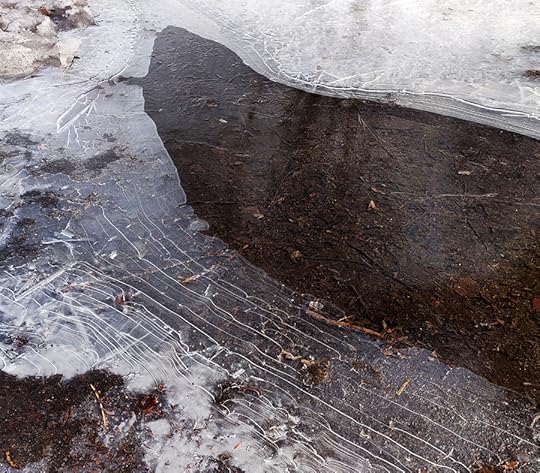
Yesterday Teju Cole asked his Facebook followers a simple question: "What's helping?" As you can imagine, the comments included a wide range of answers: everything from "the stillness" to "connecting with others." In addition to "talking to friends", a lot of people (including me) mentioned reading and music. I've been playing my piano much more lately, and I'm going to miss it badly because we are seldom going to our studio, where it lives. The cathedral, where I've been involved in music for more than a decade, is closed, and there will be no choral services for a long time. I'll have to sing to myself, or get out my flute, because there's a music quotient in my life that can only be satisfied by making music, not just by listening.
So here is a poem by Tomas Tranströmer, the late Swedish poet and winner of the Nobel Prize in Literature in 2011, who also played the piano. After suffering a stroke in 1990, his right side was paralyzed, and he taught himself to play with just his left hand. He is quoted as saying that playing was a way for him to continue living after the stroke -- though he did go on to write poetry until the early 2000s, publishing his final book, The Great Enigma, in 2004. He died in 2015, just weeks before his 84th birthday.
Allegro
I play Haydn on a black day
and feel a simple warmth in my hands.
The keys are willing. Soft hammers strike.
The resonance green, lively, and calm.
The music says freedom exists
and someone doesn't pay the emperor tax.
I push down my hands in my Haydnpockets
and imitate a person looking on the world calmly.
I hoist the Haydnflag--it signifies:
"We don't give in. But want peace."
The music is a glasshouse on the slope
where the stones fly, the stones roll.
And the stones roll right through
but each pane stays whole.
--Tomas Transtromer
March 18, 2020
Hermit Diary, Montreal. 5. Age and Wisdom
Two friends in Mexico City, 2016
I'm sure that most of us who are older have been dismayed by incidents and expressions of ageism since this epidemic started. To have to add these micro- and macro-aggressions to our own sense of increased vulnerability seems particularly bruising. When a friend told me that he had heard a young person calling the virus the "Boomer Remover" I literally felt like someone had just hit me. I was also dismayed, this past weekend, to see bars and brunch spots teeming with young people who either hadn't gotten the message about social distancing, or were deliberately flaunting it. And that wasn't just here: a friend in Europe wrote that there had been a moral outrage directed at his country’s "urbanized under-30 cool set, when it was revealed that lots of these people flaunted the curfews with 'F*%# Corona' parties in bars that were ordered closed."
On reflection, I've tried to temper my own instinctive reaction by thinking about the kind of world an under-30 person has inherited. While we praise the idealism and activism of many young people, there are some who are in it merely to maximize pleasure and profit for themselves, and still others who cannot make sense out of a world that, even before the present situation, they perceived as hopelessly polarized, dangerous, disintegrating, and devoid of opportunity. Drug and alcohol dependency is one possible reaction; nihilism is another; despair, depression and even suicidal thoughts are others.
Plenty of young people are not like that, and are certainly not wishing for this virus to cull everybody they consider "old." Maybe they were brought up differently, to be less self-centered; maybe they've been blessed with greater emotional stability; maybe they've had older family members, teachers, mentors and friends who took a genuine interest and helped give them the vital grounding anyone needs in order to become a full and responsible adult, taking their place in a world that has never been safe and secure for everyone. I'd fervently like to hear from younger people who may be reading this: please tell us how the world seems to you in this precarious moment.
Like Premier Francois Legault -- who spoke out to young Quebecers, saying he remembered being young and not wanting to listen to older people, but that this was not the time to have a party, it was a time for all of us to consider one another -- I too thought back to my own childhood and young adulthood. My father was a veteran of WWII, which had ended only a few years before I was born; every adult I knew had lost friends and family in that conflict. I grew up in America during the Cold War, when civil defense drills were a normal occurrence; I was completely convinced that my life would probably end in the blast of a nuclear bomb. After that came Vietnam, which tore the country apart, saw college students my age shot on campus, and had every young male in the country eligible to be called up in the draft. Many who served died; others were left with varying degrees of trauma; others left and went to Canada, or went to jail, or maimed themselves; some (both veterans and not) fell into the same despair and dead-end solutions as I mentioned above. There was a massive "generation gap." During those same years, many of us became early activists for the climate and ecology, choosing to live alternative lifestyles to try to maintain some integrity with our beliefs. And right after that came the AIDS epidemic, which cut down some of the brightest and best people we had known... Since then there have been more wars, leading up to 9/11, and the political, ecological, and human morass in which we find ourselves today. People who grew up in India, or Africa, or South America, or other places on earth, were all shaped by different cultural and political experiences, often much harsher than what I've described.
The thing is, anyone who's older now has seen and experienced a particular version of human history, as well as countless personal traumas, health scares, disappointments, losses, and deaths. Yet we've somehow survived, and a good many of us have actually gained wisdom about life, and being human, from what we've lived through. That wisdom seems sorely needed now, just as much as we older people need the energy and vitality of the young who will carry our hopes for humanity into the future. I'm going to try to share some of that wisdom in these posts, not just in my own words but through the writing of some of my friends.
In conclusion for today, then, here is a short recent social media post from Dick Jones, a former teacher, and continuing poet, musician, and father, who lives in London and is an old and dear friend of mine:
Sometimes I find myself just stopping half way across a room & standing still. I'm not really thinking or reflecting; I'm just feeling worn out, defeated & terribly sad. We've only just rocked & rolled our way out of 3 years of Brexit & climate crisis conflict with all of its attendant disillusionment & disgust - that final exposure of the ethical & ideological poverty, the sheer malignant, self-serving stupidity of power politics across the board. And now some half-biblical, half-shit dystopia movie plague has come rolling in like an invisible fog to gather us all up as if in reckoning for our moral failings.
Well, whatever the clichéd symbolism of Covid-19's busy, relentless work across the small, synaptic gaps between us, it brings with it one equally platitudinous requirement: that we be kind to each other. If 'only connect' now has grim connotations of infection, 'long-distance love' must take its place. The immediate casualties of this silent plague are those whose day-to-day welfare was entirely dependent on the physical proximity of others -- from the barrista dispensing a skinny rush-hour latte, to the elderly emphysema sufferer in the doctor's waiting room. We have to look after each other across the old social, political & cultural barriers. As the traditional transactions become redundant, we have to share -- mutual aid must define the way we live against the temptations of the survivalist siege. It's a choice, but surely an inexorable one...
March 17, 2020
Hermit Diary, Montreal. 4: Shakespeare
![IMG_20200317_124531[4]](https://i.gr-assets.com/images/S/compressed.photo.goodreads.com/hostedimages/1584522936i/29122770._SY540_.jpg) But when the planets
But when the planets
in evil mixture to disorder wander,
What plagues and what portents, what mutiny,
What raging of the sea, shaking of earth.
Commotion in the winds, frights changes horrors,
Divert and crack, rend and deracinate
The unity and married calm of states
Quite from their fixure!
William Shakespeare, Troilus and Cressida
It's probably not surprising for me to turn to literature during times like this, as I search for historical patterns and the meanings that past writers have found in similar events. In The Atlantic, Daniel Pollack-Pelzner, a professor of English at Linfield College, writes "Shakespeare wrote his best works during a plague:" an article about present and past theatre closures due to epidemics from bubonic plague to AIDS, and the dramatic literature that came out of those times.
Shakespeare's work is full of references to the plague, which took the lives of several of his young brothers and interrupted his own life several times. Productions had to be halted, theatres closed, and Shakespeare, as actor/producer, was left to go back to writing. In 1593, he wrote poetry during the closures, and in 1606, he wrote King Lear, Macbeth, and Antony and Cleopatra. The plague also figures in a number of his plays. Here's a quote from Pollack-Pelzner:
"In Shakespeare’s Romeo and Juliet, written just after the end of the 1593 outbreak, the friar who’s supposed to tell Romeo that Juliet is only pretending to be dead gets prevented from delivering his message because he’s quarantined with a fellow priest who’s been helping the sick: “The searchers of the town, / Suspecting that we both were in a house / Where the infectious pestilence did reign, / Sealed up the doors and would not let us forth.” Romeo never gets the message, of course, and he kills himself before Juliet revives."
Shakespeare was just echoing prevailing beliefs when he blamed plagues and earthquakes and violent storms on "planets in disorder" or the wrath of God. I'm sure there are plenty of people who would still do that, if they couldn't conveniently blame this particular horror on "foreigners." What I noticed particularly in the quote from Troilus and Cressida was the wonderfully-stated and apt comment that these disasters "divert and crack, rend and deracinate/the unity and married calm of states" from what before felt firmly fixed -- just as we now witness the world's most successful economies, and supposedly top-drawer health care systems, cracking apart and tearing up the roots of the seemingly-solid states themselves. What is new to us was not new at all to a keen observer like Shakespeare, who never stopped at the event itself, but sought to look underneath and behind and beside it, as well as having his characters predict possible futures that could result.
In watching Trump's pathetic, deluded performance during this crisis, it seems as if we're seeing a drama unfold in the same proportions as some of Shakespeare's history plays or his immortal tragedies: a tragedy that will go down through the ages in history and in literature. The king blusters and blasts and blames through the first act; in the second he concocts fantastic schemes; but by the third, he's relegated to one side of the stage, where he sits, defiant, his jaw set, having lost every shred of our sympathy, while the disaster he's failed to prevent swirls around him, his toady-ing ministers desert him, and once-minor characters begin to take the reins or emerge as heros.
What we can't see yet, of course, is how it all ends.
"Woe to that land that's govern'd by a child!
All may be well. But if God sort it so,
'Tis more than we deserve or I expect."
William Shakespeare, Richard III (II.3)
---
(Portrait drawing by me, in pencil, 3.5" x 5")
March 15, 2020
Hermit Diary, Montreal. 3
Manon always thinks she is being helpful!
This quilt project, a riff on the traditional bear-paw pattern, is perfect for incremental work: doing a little bit every day adds up quickly. I started it over a year ago and put it aside, then took it out last week when I knew the meditative, repetitive work would be helpful, and began again. The central part of the top is almost finished now, and tomorrow I'll finish sewing these blocks together and begin a border and edging. I'm looking forward to doing the hand-quilting, and hope I have something in my stash that will work for the backing, if not, I'll try mail-order and hope for the best. Most of these fabrics are William Morris prints, collected over the years or purchased specifically for this project a while back.
I didn't sleep well last night. After a solid four hours, I woke up (as I usually do) and couldn't get back to sleep, so I got up, made some of my favorite Chinese calming tea to which I added a little valerian, and curled up on the couch with my knitting. I was determined not to read any news or social media, but did see that I had a message from a close friend, and when I checked that, it reassured me and I was able to go back to sleep. I'm sure many of us are having disturbed sleep, and what could be more normal? Usually I can put myself back to sleep by following my breath or reciting familiar poetry or psalms that I know so well the words are almost automatic. Once or twice through usually does the trick. But when that doesn't work, and I've been awake half an hour or more, it's better to get up and "change my head," as my father-in-law used to say. Insomnia used to bother me a great deal. Lack of sleep was more of a problem when I was young and had business appointments in the morning, or was traveling, and I also needed more of it. Now I can function quite well on six hours for a day or two, and rarely get more than 7 1/2 - it's when low-sleep days accumulate that most of us run into trouble. On the occasional night when I do get up, knitting helps, or looking at an art book, or reading a bit if it's not too active or disturbing a book, and I can usually go back to bed in an hour or two.
The good part about this changed routine is that sleeping later in the morning is not a problem! Have you been sleeping well or not, and how do you deal with it?
Montreal is shutting down. There was little traffic today, though lots of people were out walking in the cold sunshine. Premier Francois Legault has ordered all non-essential businesses to close, including bars and restaurants. I think this is necessary, because today the brunch spots were still full of young people who don't seem to understand why social-distancing is important; last night the same was true for the popular bars. There's been inconsistency of messaging at the airports, too, and supposedly the provincial government will now send officials to make sure that every traveler is screened and told to self-isolate if they've been out of the country. I was invited, this evening, to join a solidarity group in my arrondissment; people are offering services and requesting help. I'm always impressed with grass-roots initiatives and how helpful they can be; in this case I feel like Quebec is working both top-down and grass-roots up to do the best we can in a difficult situation.
March 14, 2020
Hermit Diary, Montreal. 2
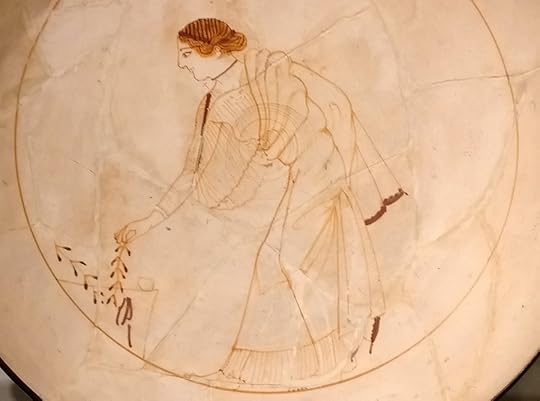
Girl Decorating an Altar. Drinking cup from Athens, c. 460 BC. Altes Museum, Berlin, with apologies for the blurriness of my photograph. The drawing is still exquisite.
Saturday, March 14, 2020
In the dream I stood facing a window in an empty house, arranging some plates that were not mine in an unfamiliar room. I turned, and saw our late friend Jenny, sitting on a couch or bench, dressed in white, her hair long and wavy as it was many years ago. She smiled her inimitable smile, and we talked, but I can't remember our words or what they were about -- what I remember are her face, the whiteness and emptiness of the room, and its calmness.
After I woke up, I knew this dream had something to do with the virus and our fears of death, but that it also had to do with the endurance of friendship and love. Today I called several friends and wrote to others; my father and another friend called us; I made soup and cornbread for lunch and sent some across the city to a dear friend who's been sick with seasonal flu. I thought about our cathedral and its motto, "An Oasis in the Heart of Montreal," and what that could mean not just to our community but to the city at large, if we can manage to be creative and innovative in our outreach even while regular services are suspended. It was a sunny day, a bit warmer than usual, and my husband and I went out for a long walk. This evening, in the new, longer-lasting light, we ventured out onto our nearly-snowless terrace with our gin-and-tonics, and toasted each other and the coming spring before scooting back inside.
In all of these conversations, of course, we spoke about what we were doing to prepare or take precautions for the coming days. Quebec Premier Francois Legault today asked that all persons 70 years and older stay in their homes as much as possible -- this in addition to all the other closures and directives already in place. My husband and I aren't quite at that age, but many of our friends are. Two of our younger friends have already offered to shop for us or do errands if needed, and we were both surprised and appreciative; I felt sort of the way I do when someone gets up and offers their seat on the bus or metro, because I feel so much younger than I probably look. I usually decline, but I appreciate the gesture, which always comes from someone who's aware of what's going on around them, unlike some of the passengers whose faces are buried in their phones. I won't be riding on public transit for a long while, but what we need now is a lot of that sort of awareness -- people looking out for each other, and functioning as a community rather than individuals concerned only about themselves. In Canada the majority of people, including the young, are polite and pay attention to others, and I think this crisis may bring out the best in us as well as teaching some, who don't realize it yet, the virtue of being that way.
A typical and funny Montreal moment from our walk: a young girl, maybe ten or eleven years old, ran up behind us and asked a question in French. Neither of us had heard her clearly, so I asked, in French, what she had said. She tilted her head, touched her finger to her chin, and said, "Anglais?" I nodded helplessly -- once again found out, and this time by a child! -- and she asked, in perfect English, "Could you please tell me where the dog park is?" I'm so envious of this seemingly effortless bilingualism of the young, which is the norm all across this city.
--
Though I won't be with them for a while, our choir will sing Evensong tomorrow as a radio- and live-streamed broadcast from the cathedral. If you'd like to listen, it's at 4:00 pm Eastern Daylight Savings Time on Radio Ville-Marie, here. The meditative hour-long program, with readings and prayers in French and English, is as follows:
Prelude: Chorale Prelude on 'Eventide', C Hubert H Parry
Introit: Call to remembrance, Richard Farrant
Responses: Bernard Rose
Psalm: 40
Canticles: Blair in B minor
Anthem: Wie der Hirsch schreit, Felix Mendelssohn
Postlude: Prelude & Fugue in C minor BWV 546, Johann Sebastian Bach
March 13, 2020
Hermit Diary, Montreal. 1.
What a changed situation in just a few days. From Canada, we've watched the disarray and slowness of the U.S. health care response to COVID-19 in dismay, as the reported number of cases keep rising, surely far more slowly than the real count. All worldwide evidence has pointed to the fact that the sooner countries act to limit transmission, the slower the infection rate, and the lower the mortality, because the health care system will be less overwhelmed -- the opposite of what has happened with such tragic results in Italy.
Yesterday, Prime Minister Trudeau and Quebec Premier Francois Legault both announced sweeping measures designed to isolate returning travelers and create social distance: from airline controls to school and public facility closures and bans on large social gatherings. Churches, including our cathedral, have cancelled weekend services and masses. Hockey will be played in an empty arena. Today Trudeau said that the government is considering closing the border with the U.S. or enacting other, tighter controls; it's impossible to know exactly what we'll be dealing with in another week. I'm surprised at the range of attitudes I've heard from friends and family in the U.S. and elsewhere. Some people clearly get what's happening and what they need to do, others are still in denial. Unfortunately, a large majority of us need to get on the same page. Here's a good link to what social distancing actually means in practice, with clear recommendations for different risk groups.
There are 17 reported cases in the province of Quebec right now, and will certainly be more. I'm completely in favor of immediate, strict measures to limit social interaction. The federal government will also be helping people who are out of work or otherwise impacted by the closures, and, thankfully, everyone in Canada has health coverage.
On the home front, I was glued to the computer much of yesterday because events were moving so fast; that day was the tipping point when "what if" debates turned into decisions and actions. We received a grocery delivery last night; the delivery person said it was busy but not crazy. Today we heard that people are flocking to stores, even lining up in the early morning before large stores opened, and that many essentials are sold out. Canadians aren't quite as panicky as some people, though, and I think and hope this will settle down. I'm grateful and proud of the government here for taking a strong proactive approach, and fervently hope it helps protect both the people and the healthcare system and workers.
Today I've tried to mostly stay off the internet. I've corresponded with friends, done some cooking, walked up to my studio in a blustery wind, worked on a quilt project, practiced a Scarlatti sonata. There's evidence of spring not only in the March weather, but in bulbs sticking their noses out of the earth, buds beginning to swell on magnolias, stems of hardy roses turning green, even though the sidewalks are still lined with ice and snow. My mood is mostly calm; we're doing what we need to do personally, the government and institutions are acting, and much of the rest is out of our control. The tasks ahead will be to make positive use of this very un-ordinary time and to try to help others for whom it's more difficult, devising ways of communicating and connection that may be different or new, as well as keeping myself as calm as possible, still with eyes wide open.
Here's a previous post that I didn't publish, from earlier this week, with questions for you:
Mexico City interior, two years ago.
Monday, March 8, 2020
We were supposed to be waking up this morning in the warmth and color of Mexico City, but instead, I'm looking out the window at wan sunshine on melting ice, and the grey snow that lines the streets of Montreal. Like many other people, we reluctantly cancelled our travel plans at the last minute -- in fact, half an hour before we were going to call the taxi to the airport -- and have been trying to re-set our heads as well as our clocks, and adjust to an unpredictable and uncharted short-term future.
The flight south was to have been last Tuesday, which probably would have been all right, but we were more worried about getting back home on March 20th, and I was concerned about the effect of the air pollution on my lungs, which were not particularly happy the last time we were there. Coming back with even a slightly compromised respiratory system didn't seem like a good idea. There are few confirmed virus cases in Montreal so far, only four as of this writing, and few in Mexico, but Montreal is a big international city with a large airport through which world travelers are moving, especially to and from Europe and the U.S., every day. It's the airports and air travel that worried us, as well as the fast-moving situation of both the virus, and the unknown governmental responses to it.
Then too, we're both over 65, with some underlying conditions. In spite of the fact that we're both generally quite healthy and vigorous for our age, all the best advice and evidence pointed to one conclusion: that we should avoid unnecessary travel, definitely not take airplanes or public transit, and stay at home maintaining "social distance" as much as possible. Since we made that decision, which was somewhat of an educated guess a week ago, our certainty has increased; now I wouldn't hesitate to cancel and stay home.
Over the past few days we've bought basic supplies so that we won't have to run to the stores every day, but I wouldn't call it stockpiling; we live a couple of blocks from an area of small market shop that are likely to continue to serve our neighborhood. There are few shortages here so far. We should have no trouble continuing to walk (or soon bike) back and forth to our studio. Other than that, we won't be going out much at all. We mostly plan to live a hermit-like existence while this thing plays out however it does, minimizing our exposure as much as possible. Maybe we'll get sick anyway, but we intend to try hard not to.
So I thought maybe I'd keep a diary of these unusual days. I'll write a bit about the progress of the virus in a city where we're starting practically at zero, but I'd also like to write about what far-flung friends are saying in other parts of the world, since one thing this situation has done is prove precisely how interconnected we are. (And I'd like to hear from you if you're reading this blog!) I'd also like to write about staying busy and sane in a slowed-down, quieter, more inner state of existence over the next weeks. Living that way is not particularly foreign to me, or to us, but I know it will be unfamiliar and difficult for many people. There will be art happening, and music, and cooking, and textile work, language study, reading, and correspondence with friends. Spring will slowly arrive, and I'll be happy to be outside more. But I won't be singing as much, if at all, or going to services at the cathedral or concerts or social gatherings; I probably won't be traveling to the U.S. for a while either. I'm lucky that I can even make these decisions; a lot of people have a much more complicated life to juggle, or are living in situations where they have very little control. Having to cancel a trip may be the least of the disruptions many of us will face. But I don't think it necessarily has to be onerous to live differently for a while; it could even be a time of reassessing some of the behaviors and patterns we've taken for granted for years.
Let's see how it goes. And please send me a note at cassandra (dot) pages (at) gmail (dot) com if you'd like to contribute a post or say something about what it's like where you are, and how you're managing the changes in your life. Staying anonymous is fine. I'd welcome a few regular correspondents from different parts of the world, and will be cross-posting from this blog to social media.
February 22, 2020
Snowscapes of home
The landscape of central New York State, where I grew up, is unmistakable to anyone who has lived there, and when there's snow on the ground it accentuates the forms of the land. I took some pictures from the car when we were visiting my father back in January, and recently made some drawings in pen-and-ink with a light wash added at the end.
The bare, mostly-deciduous trees, the gently rolling hills, the snowy fields, the fences and weeds sticking up through the snow, the fallen branches and isolated farm buildings and roads all contribute to the particular feeling of these rural landscapes that begin somewhere near Canajoharie and stretch past Utica to the east and west, and continue down to the south toward Binghamton.
Better seen from Rt 20 than from the Thruway, it's a pastoral patchwork of small farms, creeks, swamps, and woods that changes with every dip or turn in the road, and has a particular beauty I've never encountered anywhere else. It got imprinted on me at an early age, and will always say "home."

![IMG_20200321_161223[1]](https://i.gr-assets.com/images/S/compressed.photo.goodreads.com/hostedimages/1585055673i/29160102._SX540_.jpg)
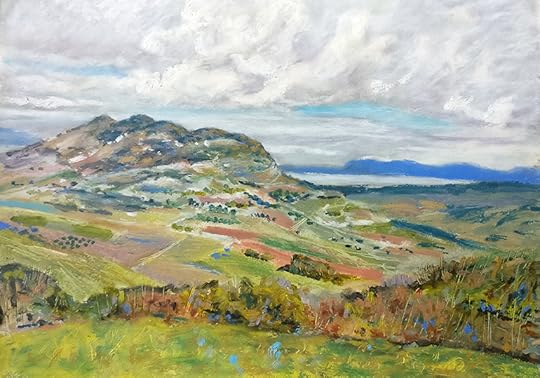
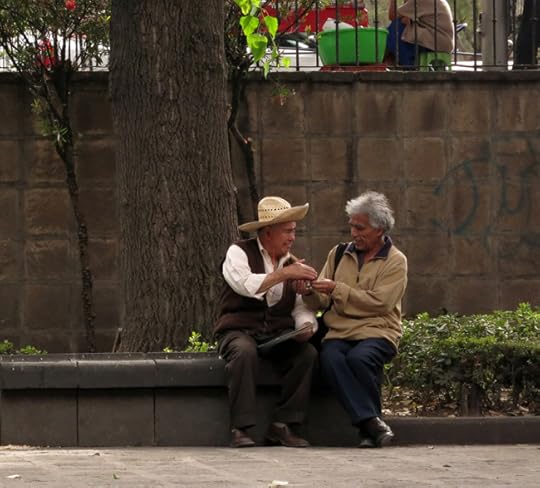
![IMG_20200315_150508[1]](https://i.gr-assets.com/images/S/compressed.photo.goodreads.com/hostedimages/1584354840i/29114168._SX540_.jpg)


